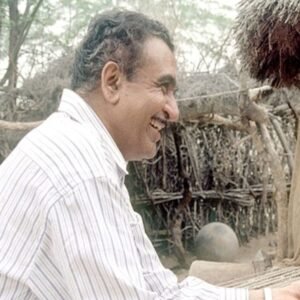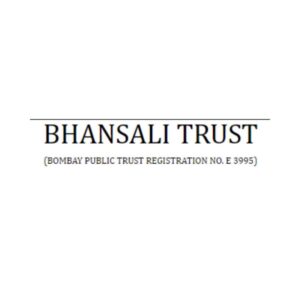Mr. Mahesh Bhansali
Bhansali Trust
Area of Intervention
Bhansali Trust has undertaken a diverse range of initiatives in fields such as healthcare, education, income generation, micro-credit, de-addiction, and various socio-economic endeavors.

About
Established in 1969, the Bhansali Trust originated from the unity of seven brothers belonging to the Bhansali Family (Bhansali & Co). Over the years, it has diligently undertaken a diverse range of initiatives in fields such as healthcare, education, income generation, micro-credit, de-addiction, and various socio-economic endeavors. Additionally, the trust has actively engaged in relief efforts during natural disasters. These endeavors have predominantly focused on the economically disadvantaged regions of Gujarat, particularly those bordering Rajasthan.
Dinesh, the eldest brother, held a profound commitment to aiding individuals in distress. His journey commenced in a small village in North Gujarat, and by 1950, he had established himself in Mumbai, earning a living from the age of 16. Remarkably, he pledged a minimum of 20% of his earnings to support those less fortunate—a decision made during a period when the family was grappling to make ends meet. Dinesh firmly embraced the notion that happiness lies in giving rather than accumulating. Together with his brother Mahesh, he played a pivotal role in creating the Trust, with the whole family contributing financially to this noble cause.
Mahesh Bhansali, after completing his engineering degree at VJTI, Mumbai, made a life-altering decision at the age of 25: he chose not to marry and instead dedicated his entire life to social work. For the past five decades, he has resided and labored in the villages of North Gujarat. The youngest member of the family, Ashok, alongside his wife Shital, commenced dedicating five days each month to the project area in 1983. Currently, they allocate a significant portion of their time, 12 days a month, to oversee projects in various states. Ashok has devoted 90% of his time to corporate social responsibility (CSR) activities and tribal projects. Prakash Bhansali assumes responsibility for managing the operations at the Mumbai office. Notably, the government has entrusted us with the administration of 1,200 Anganwadis under the Integrated Child Development Services (ICDS) program over the past two decades.
A significant portion of their projects originated from the urgent needs of the communities they served. In response to alarmingly high mortality rates attributed to tuberculosis (TB), they initiated a substantial TB Control Program, which encompassed 1,200 villages. Recognizing the widespread issue of opium addiction, particularly in the neighboring region of Rajasthan, they also undertook opium de-addiction programs to assist individuals in breaking free from this destructive habit.
Furthermore, the persistent threat of epidemics and the unfortunate loss of lives prompted them to implement immunization initiatives. Their goal was to curtail the incidence of epidemics and reduce infant mortality rates, thereby safeguarding the health of vulnerable populations.
In their unwavering commitment to providing healthcare access to the most underprivileged and needy individuals, they established two hospitals. These hospitals operated with a strong focus on affordability, often offering healthcare services at minimal or no cost to ensure that those in dire need received the care and support they required.
Bhansali Trust’s Impact:
- The percentage of severely malnourished children has significantly decreased, dropping from 15% to a remarkable 3%.
- Major epidemics of measles, whooping cough, and diphtheria have been notably curtailed through regular vaccination programs.
- The infant mortality rate has seen a remarkable 50% reduction.
- A successful Safe Motherhood Program, along with training for Traditional Birth Attendants (Dais) and the implementation of various measures, has led to a substantial decline in maternal deaths, reducing them from 7.5 per 1000 births to just 1.5.
- Childhood blindness has been nearly eradicated, ensuring a brighter future for young lives.
- Night blindness, a prevalent issue among adults, has been completely eradicated.
- Over the past 8 years, an impressive total of 12,031 laparoscopic surgeries have been performed to support family planning efforts.
- Eye Care:
- Across Gujarat, Bihar, Rajasthan, and Madhya Pradesh, over 850,000 cataract surgeries have been performed, significantly improving eye health.
- Since 2014, eye operation camps have been organized in Jharkhand, extending the reach of eye care services.
- Education:
- The Women’s literacy rate, once alarmingly low, has shown steady improvement, with a significant number of children now attending school.
- Girls have gained access to high schools, and an impressive 2,000 students from high schools supported by the trust have gone on to become teachers.
- Income Generation:
- In addition to promoting income generation projects such as papad making and sewing, the trust provides small loans to empower underprivileged families to start their own businesses.
- A network of 4,800 Self Help Groups (Micro Credit Groups) has been formed in a relatively small area with a population of 1 million.
- As a result, 65,000 families have been able to break free from high-cost debt cycles, accessing loans at low-interest rates to initiate their own small businesses.
- Many families have even sent their children for higher education by leveraging loans from their respective Self Help Groups.
